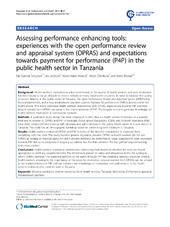| dc.contributor.author | Songstad, Nils Gunnar | |
| dc.contributor.author | Lindkvist, Ida | |
| dc.contributor.author | Moland, Karen Marie | |
| dc.contributor.author | Chimhutu, Victor | |
| dc.contributor.author | Blystad, Astrid | |
| dc.date.accessioned | 2013-03-07T14:31:06Z | |
| dc.date.available | 2013-03-07T14:31:06Z | |
| dc.date.issued | 2012-09-10 | eng |
| dc.identifier.issn | 1744-8603 | |
| dc.identifier.uri | https://hdl.handle.net/1956/6398 | |
| dc.description.abstract | Background Health workers’ motivation is a key determinant of the quality of health services, and poor motivation has been found to be an obstacle to service delivery in many low-income countries. In order to increase the quality of service delivery in the public sector in Tanzania, the Open Performance Review and Appraisal System (OPRAS) has been implemented, and a new results-based payment system, Payment for performance (P4P) is introduced in the health sector. This article addresses health workers’ experiences with OPRAS, expectations towards P4P and how lessons learned from OPRAS can assist in the implementation of P4P. The broader aim is to generate knowledge on health workers’ motivation in low-income contexts. Methods A qualitative study design has been employed to elicit data on health worker motivation at a general level and in relation to OPRAS and P4P in particular. Focus group discussions (FGDs) and in-depth interviews (IDIs) have been conducted with nursing staff, clinicians and administrators in the public health sector in a rural district in Tanzania. The study has an ethnographic backdrop based on earlier long-term fieldwork in Tanzania. Results Health workers evaluated OPRAS and P4P in terms of the benefits experienced or expected from complying with the tools. The study found a general reluctance towards OPRAS as health workers did not see OPRAS as leading to financial gains nor did it provide feedback on performance. Great expectations were expressed towards P4P due to its prospects of topping up salaries, but the links between the two performance enhancing tools were unclear. Conclusions Health workers respond to performance enhancing tools based on whether the tools are found appropriate or yield any tangible benefits. The importance placed on salary and allowances forms the setting in which OPRAS operates. The expected addition to the salary through P4P has created a vigorous discourse among health workers attesting to the importance of the salary for motivation. Lessons learned from OPRAS can be utilized in the implementation of P4P and can enhance our knowledge on motivation and performance in the health services in low-income contexts such as Tanzania. | en_US |
| dc.language.iso | eng | eng |
| dc.publisher | BioMed Central | eng |
| dc.rights | Attribution CC BY | eng |
| dc.rights.uri | http://creativecommons.org/licenses/by/2.0/ | eng |
| dc.subject | Working conditions | eng |
| dc.subject | Human resources | eng |
| dc.subject | Rural health services | eng |
| dc.subject | Tanzania | eng |
| dc.subject | Motivation | eng |
| dc.subject | Performance appraisal | eng |
| dc.subject | Results-based payment | eng |
| dc.title | Assessing performance enhancing tools: experiences with the open performance review and appraisal system (OPRAS) and expectations towards payment for performance (P4P) in the public health sector in Tanzania | eng |
| dc.type | Peer reviewed | |
| dc.type | Journal article | |
| dc.description.version | publishedVersion | en_US |
| dc.rights.holder | Copyright 2012 Songstad et al; licensee BioMed Central Ltd. | |
| dc.identifier.doi | https://doi.org/10.1186/1744-8603-8-33 | |
| dc.identifier.cristin | 975352 | |
| dc.source.journal | Globalization and Health | |
| dc.source.40 | 8 | |
| dc.source.14 | 33 | |

